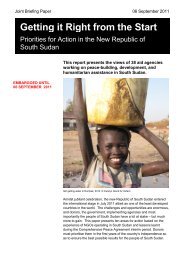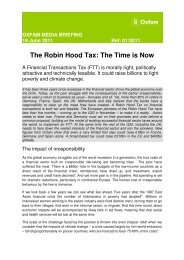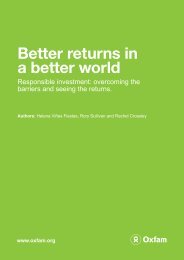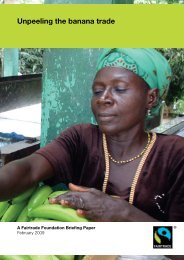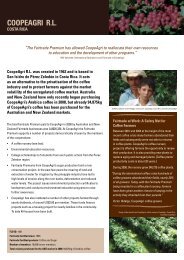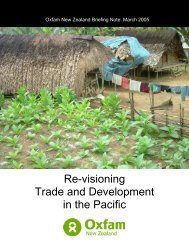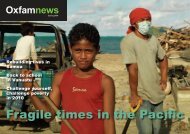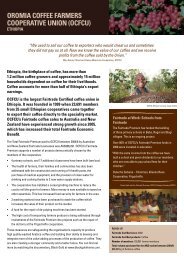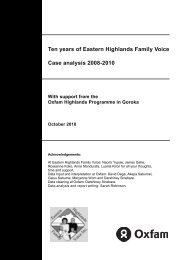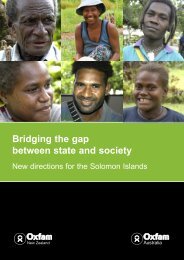Oxfam New Zealand Comments on the NZAID Pacific Strategy ...
Oxfam New Zealand Comments on the NZAID Pacific Strategy ...
Oxfam New Zealand Comments on the NZAID Pacific Strategy ...
Create successful ePaper yourself
Turn your PDF publications into a flip-book with our unique Google optimized e-Paper software.
The lack of inclusi<strong>on</strong> of trade policy in <strong>the</strong> <strong>Pacific</strong> strategy is surprising in <strong>the</strong><br />
light of <strong>the</strong> recent Ministerial Review of Progress in Implementing 2001<br />
Cabinet Recommendati<strong>on</strong>s establishing <strong>NZAID</strong> (<strong>the</strong> Waring review). While <strong>the</strong><br />
findings of <strong>the</strong> review have <strong>on</strong>ly recently been made public, <strong>the</strong>y were<br />
presumably known to <strong>NZAID</strong> during <strong>the</strong> formative stage of preparing this draft<br />
c<strong>on</strong>sultati<strong>on</strong>.<br />
The Waring Review c<strong>on</strong>cluded that “<strong>NZAID</strong>’s effectiveness in <strong>the</strong> <strong>Pacific</strong><br />
regi<strong>on</strong> is inhibited by <strong>the</strong> lack of coherence strategy covering all <str<strong>on</strong>g>New</str<strong>on</strong>g> <str<strong>on</strong>g>Zealand</str<strong>on</strong>g><br />
agencies operating in <strong>the</strong> regi<strong>on</strong>.” (page 25).<br />
The review’s recommendati<strong>on</strong> 12 states:<br />
“That a programmed and inclusive strategic process, directed at coherence,<br />
operati<strong>on</strong>al sustainability and effectiveness of delivery, which recognises <strong>the</strong><br />
<strong>Pacific</strong> strengths of <strong>NZAID</strong>, be established as a matter of urgency for <strong>the</strong><br />
Government as a whole, with reliable regular mechanisms of accountability<br />
and reporting to enable a cohesive multi-agency process for <strong>Pacific</strong><br />
engagement.” (page 25).<br />
<strong>NZAID</strong> has a clear mandate to work <strong>on</strong> trade in <strong>the</strong> <strong>Pacific</strong>. <strong>NZAID</strong>’s policy<br />
‘Harnessing Trade for Development’ calls for critical factors to be in place for<br />
trade to c<strong>on</strong>tribute to development. It is clear that <strong>the</strong>se factors are not in<br />
place in <strong>the</strong> <strong>Pacific</strong>.<br />
Therefore a relevant questi<strong>on</strong> for this strategy is whe<strong>the</strong>r <strong>NZAID</strong> will apply its<br />
influence to change put in place <strong>the</strong> necessary c<strong>on</strong>diti<strong>on</strong>s, implying a slow<br />
pace of negotiati<strong>on</strong>s, or questi<strong>on</strong> <strong>the</strong> appropriateness of <strong>the</strong> trade<br />
liberalisati<strong>on</strong> initiatives to <strong>the</strong> <strong>Pacific</strong>.<br />
<str<strong>on</strong>g>Oxfam</str<strong>on</strong>g> c<strong>on</strong>siders that it is vital that <strong>NZAID</strong>’s <strong>Pacific</strong> strategy does not duck <strong>the</strong><br />
challenge of policy coherence. Trade policy is important to <strong>the</strong> <strong>Pacific</strong>, it is<br />
important to <strong>the</strong> achievement of <strong>the</strong> aims of this strategy and it is important<br />
that <strong>NZAID</strong> play an active role in shaping <str<strong>on</strong>g>New</str<strong>on</strong>g> <str<strong>on</strong>g>Zealand</str<strong>on</strong>g>’s trade policy so that it<br />
supports poor and vulnerable people in <strong>the</strong> <strong>Pacific</strong>.<br />
We <strong>the</strong>refore recommend that <strong>the</strong> strategy include two additi<strong>on</strong>al <strong>NZAID</strong><br />
programme areas to:<br />
• Support <strong>the</strong> <strong>Pacific</strong> governments to build <strong>the</strong>ir capacity, and that<br />
of civil society, to be able to undertake objective and independent<br />
research and assessment, to develop alternative policy opti<strong>on</strong>s<br />
(as part of <strong>the</strong> commitment to “sound, evidence-based policy”),<br />
and to build a basis for wide c<strong>on</strong>sultati<strong>on</strong> and public educati<strong>on</strong><br />
(as part of <strong>the</strong> commitment to good governance)<br />
• Strive for policy coherence towards <strong>the</strong> <strong>Pacific</strong> within <strong>the</strong> <str<strong>on</strong>g>New</str<strong>on</strong>g><br />
<str<strong>on</strong>g>Zealand</str<strong>on</strong>g> government and with multilateral agencies, including<br />
trade policy (extend Para 59). This programme area should be<br />
explicit about <strong>NZAID</strong>’s own capacity building needs and <strong>the</strong> ways<br />
in which <strong>the</strong> <str<strong>on</strong>g>New</str<strong>on</strong>g> <str<strong>on</strong>g>Zealand</str<strong>on</strong>g> government could be engaging with



